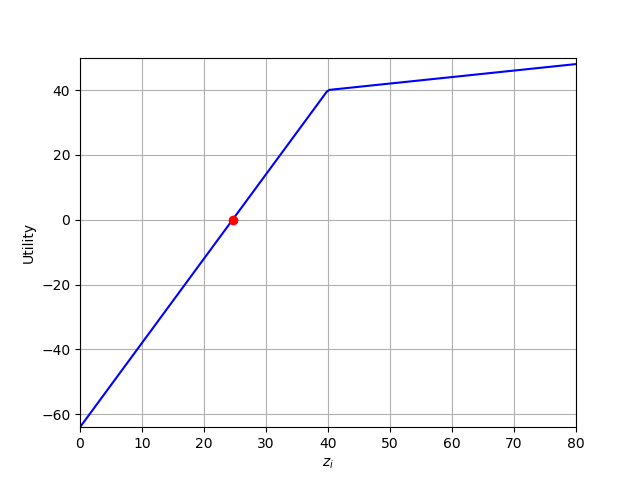I am preparing for an exam. I have found an old exam but I have no solutions for it, so I tried to solve it, but I dont know if I did it correctly and need therefore your help.
The problem looks as follows:
Ultimatum game, proposer (Player 1) and responder (Player 2) bargain about the distribution of 80 Euro. The proposer offers an amount$\ [0; 80]$ to the responder who may accept or reject this offer. If responder accepts, he gets$\ z_2$ and the proposer gets$\ z_1=80-z_2$. In case of rejection, both get nothing.
I am looking for the subgame perfect Nash equilibrium.
$\ U_i=z_i-0,4max(z_i-z_j,0)-0,8max(z_j-z_i,0) , i\neq j , \epsilon (1,2) $
First of all, I am confused since usually the assumption is $ \underline{\beta>\alpha}$. This, does not apply here in my opinion. Since the term $\ 0,4max(z_i-z_j,0)$ expresses envy, where the$\ 0,4$ is generally expressed as an $\alpha$, but given here as a number. On the other side, the term$\ 0,8max(z_j-z_i,0)$ expresses fariness, generally given by the preference paramter $\beta$.
Anyway, I tried to solve it via backwardinduction as follows:
2nd Stage:
i) Responder accepts if $\ z_2>z_1$ and it holds that
$\ U_2=z_2-0,4(z_2-z_1)>0$
$\ z_2>0,4(z_2-z_1)$
I think, this condition will never be satisfied, because the propeser will never offer more than half of the amount in question, the 80 Euro here in this example? For me that is the reason why the term $\ 0,4max(z_i-z_j,0)$ in the utility function just gets zero.
ii) Responder accepts if $\ z_1\geq z_2$
$\ U_2=z_2-0,8(z_1-z_2)>0$
$\ z_2>0,4(z_1-z_2)$ with $\ z_1=80-z_2$
$\ z_2>0,4(80-2z_2)$
$\ z_2>\frac{320}{13} $
I think, I dont need the 1. Stage anymore since I already calculated the optimal share of the 80?
That is: $ z_2*= \frac{320}{13}+\varepsilon $ , where $\varepsilon $ is the smallest possible amount to add.
$ z_1*= 80-\frac{320}{13}-\varepsilon $
Questions:
Is my categorization regarding envy and fairness correct?
Is it of any importance for calcutlations that $\beta>\alpha$?
Is it correct that$\ z_2>z_1$ will never be fullfilled?
Is my subgame Nash equilibrium correct?
Did I miss something?
Is there a more easy approach, if preferences towards envy and fairness are given?
I would be very greatful for some help on this problem.
Many thanks in advance.
